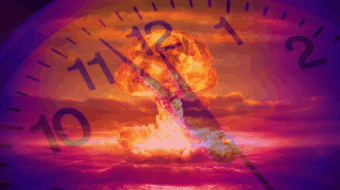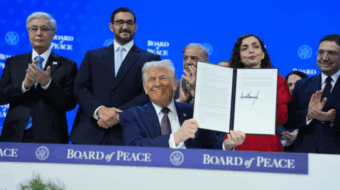After years out of the headlines – and out of most people’s minds – this year nuclear weapons policy and the path to complete abolition has come to the fore again, through developments including the unveiling of the new U.S. Nuclear Posture Review, the Nonproliferation Treaty review conference, and the signing of the New START treaty by President Obama and Russian President Dmitry Medvedev.
The momentum has continued with last month’s bipartisan 14-4 vote in the Senate Foreign Relations Committee to send New START to the full Senate for ratification.
Nuclear weapons policy, and in particular New START, has even become an issue in at least one Senate campaign. As they contest an open seat in Utah, Democrat Sam Granato advocates a nuclear-free world and calls for the treaty’s ratification, while Republican candidate and Tea Party favorite Mike Lee opposes the pact, asserting it would restrict U.S. national security possibilities.
A vote on ratification could be on the Senate’s agenda during the “lame duck” session after Nov. 2. Secretary of State Hillary Rodham Clinton said last month she’d like to see a vote before the current Congress disbands at the end of the year.
The U.S. and Russia, between them, have the overwhelming majority of the world’s nuclear weapons. The treaty would make modest, 30 percent cuts in the two countries’ long-range offensive nuclear weapons, limiting them to 1,550 each.
To get even a handful of Republicans to vote for New START, the Senate Foreign Relations Committee added a nonbinding “resolution of ratification” stating the pact imposes virtually no limitations on U.S. development of anti-missile defense systems.
Peace and nuclear disarmament advocates regard such systems as having little chance of successful development, and if they were to succeed, as potential triggers for an arms race that could bring on the very wars they are supposed to forestall.
But despite the resolution, most peace organizations see the U.S.-Russian treaty itself as a modest but vital step toward the total worldwide abolition of nuclear weapons.
While the Foreign Relations Committee’s 14-vote majority included three Republicans, among them Indiana Sen. Richard Lugar, other powerful Republican senators have signaled their objections to the pact. Some Republicans are even pressing to hold off the vote until 2011, hoping they’ll have more Senate seats then.
Just before the Foreign Relations Committee vote, Arizona Sen. John McCain, the Armed Service Committee’s ranking Republican – who hasn’t said which way he plans to vote – called for a binding ban on limiting missile defenses. McCain is also among those, including Sens. Jon Kyle, R-Ariz. and Lamar Alexander, R-Tenn., demanding more funds to modernize the nuclear arsenal.
The Intelligence Committee’s ranking Republican, Missouri Sen. Kit Bond, has called the pact “very weak” on verification, while fellow committee member, Idaho Republican Sen. Jim Risch, has raised other, unspecified intelligence concerns.
Other Republicans including Foreign Relations Committee member Jim DeMint, R-S.C., who was absent from the committee vote, have said they are likely to vote no.
Backing for the pact is coming from a broad range of viewpoints, including peace, environmental and scientific organizations, the faith community, defense officials and military leaders.
Writing before the Senate committee vote, Dr. Ira Helfand, co-founder and past president of Physicians for Social Responsibility, called ratification “critical to our relationship with Russia … and to countries around the world that view this vote as a test of our sincerity about meeting our obligations to decrease our nuclear arsenal.” Helfand, whose organization is the U.S. affiliate of International Physicians for the Prevention of Nuclear War, said that with the treaty, “we will start to create a more manageable and stable world without nuclear weapons.”
Helfand contrasted the Senate Republicans’ reluctance to back the treaty with the support it has received from “the Republican defense establishment” starting with Secretary of Defense Gates, and including such luminaries as Henry Kissinger, James Schlesinger and Colin Powell. The treaty is also backed by the current Pentagon leadership.
Immediately after the committee vote, Peace Action political director Paul Kawika Martin called New START “a small but necessary step towards President Obama’s vision of a world free of nuclear weapons,” and noted that Americans across party lines as well as bipartisan national security and military leaders overwhelmingly agree that “fewer nuclear weapons make the world a safer place.”
Matthew McKinzie, senior scientist with the Natural Resources Defense Council’s nuclear program, urged prompt ratification, observing that while the treaty is not enough by itself, “when viewed as part of a continuing process of cooperation and communication between the United States and Russia, New START is a critical step forward.”
Noting the importance of a bipartisan vote “in a time of partisanship,” Tri-Valley Communities Against a Radioactive Environment (Tri-Valley CAREs) executive director Marylia Kelley said the treaty’s ratification “would make us all – Americans, Russians and peoples everywhere – a bit more safe and secure.” But she observed that Kyl and other senators seek to hold New START “hostage to funding for new and modified U.S. nuclear weapons and new bomb plants to produce them,” and warned that implementing such activities “would effectively drown the nonproliferation benefits of the treaty.”
Now is the time to urge your senators to back this crucial New START on the road to a nuclear-free world, and to oppose funds for new or modified nukes.
Photo: White.gov










